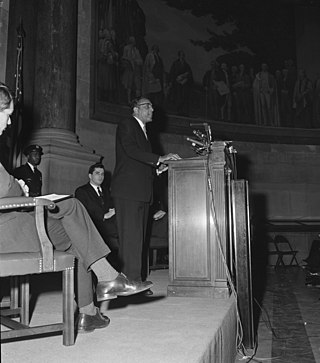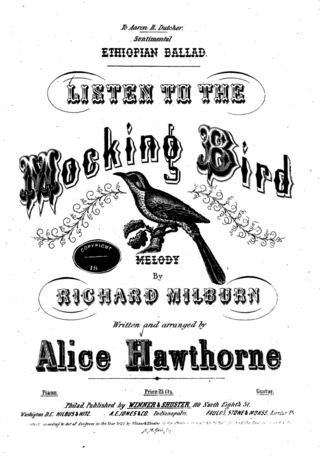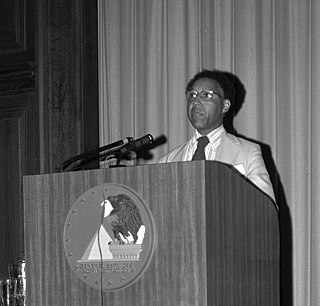Black History Month is an annual observance originating in the United States, where it is also known as African-American History Month. It has received official recognition from governments in the United States and Canada, and more recently has been observed in Ireland and the United Kingdom. It began as a way of remembering important people and events in the history of the African diaspora. It is celebrated in February in the United States and Canada, while in Ireland and the United Kingdom it is observed in October.

Carter Godwin Woodson was an American historian, author, journalist, and the founder of the Association for the Study of African American Life and History (ASALH). He was one of the first scholars to study the history of the African diaspora, including African-American history. A founder of The Journal of Negro History in 1916, Woodson has been called the "father of black history." In February 1926, he launched the celebration of "Negro History Week," the precursor of Black History Month. Woodson was an important figure to the movement of Afrocentrism, due to his perspective of placing people of African descent at the center of the study of history and the human experience.
Lorenzo Johnston Greene (1899–1988) was an American educator who taught history at Lincoln University in Jefferson City, Missouri from 1933 to 1972. His book, Missouri’s Black Heritage, co-authored by Antonio Holland and Gary Kremer, was a pioneering work on the African-American experience in Missouri. He co-authored several works and his historical diaries and notes have been used in other historical texts, such as Selling Black History for Carter G. Woodson. He worked with Carter Woodson, who was known as the "Father of Black History".
The Association for the Study of African American Life and History (ASALH) is a learned society dedicated to the study and appreciation of African-American History. The association was founded in Chicago on September 9, 1915, during the National Half Century Exposition and Lincoln Jubilee, as the Association for the Study of Negro Life and History (ASNLH) by Carter G. Woodson, William B. Hartgrove, George Cleveland Hall, Alexander L. Jackson, and James E. Stamps, and incorporated in Washington, D.C., on October 2, 1915. The association is based in Washington, D.C. In 1973, ASNLH was renamed the Association for the Study of Afro-American Life and History.

Charles Harris Wesley was an American historian, educator, minister, and author. He published more than 15 books on African-American history, taught for decades at Howard University, and served as president of Wilberforce University, and founding president of Central State University, both in Ohio.

Carter G. Woodson Home National Historic Site at 1538 9th Street NW, in the Shaw neighborhood of Washington, D.C., preserves the home of Carter G. Woodson (1875–1950). Woodson, the founder of Black History Month, was an African-American historian, author, and journalist.
The Journal of African American History, formerly The Journal of Negro History (1916–2001), is a quarterly academic journal covering African-American life and history. It was founded in 1916 by Carter G. Woodson. The journal is owned and overseen by the Association for the Study of African American Life and History (ASALH) and was established in 1916 by Woodson and Jesse E. Moorland. The journal publishes original scholarly articles on all aspects of the African-American experience. The journal annually publishes more than sixty reviews of recently published books in the fields of African and African-American life and history. As of 2018, the Journal is published by the University of Chicago Press on behalf of the ASALH.

The Mis-Education of the Negro is a book originally published in 1933 by Dr. Carter G. Woodson.

Music and Some Highly Musical People is a history of African-American music by James Monroe Trotter first published in 1878. It represents perhaps the first attempt to assess American music across multiple genres in a single volume.
Afrocentric education refers to a pedagogical approach to education designed to empower people of the African diaspora with educational modes in contact and in line with the cultural assumptions common in their communities. A central premise behind it is that many Africans have been subjugated by having their awareness of themselves limited and by being indoctrinated with ideas that work against them and their cultures.

Richard Milburn, known as Whistling Dick, was a negro musician in Philadelphia. He was a great guitarist and whistler and composed bird song themes including the tune Listen to the Mocking Bird which, when arranged with lyrics by Septimus Winner, became one of the most successful ballads of the 19th century, selling over twenty million copies of sheet music. Milburn made $5 for this while the finished work went on to make over $100,000.

Norris Wright Cuney, or simply Wright Cuney, was an American politician, businessman, union leader, and advocate for the rights of African-Americans in Texas. Following the American Civil War, he became active in Galveston politics, serving as an alderman and a national Republican delegate. He was appointed as United States Collector of Customs in 1889 in Galveston. Cuney had the highest-ranking appointed position of any African American in the late 19th-century South. He was a member of the Union League and helped attract black voters to the Republican Party; in the 1890s, more than 100,000 blacks were voting in Texas.

Maud Cuney Hare was an American pianist, musicologist, writer, and African-American activist in Boston, Massachusetts in the United States. She was born in Galveston, the daughter of famed civil rights leader Norris Wright Cuney, who led the Texas Republican Party during and after the Reconstruction Era, and his wife Adelina, a schoolteacher. In 1913 Cuney-Hare published a biography of her father.

Black Metropolis: A Study of Negro Life in a Northern City, authored by St. Clair Drake and Horace R. Cayton, Jr., is an anthropological and sociological study of the African-American urban experience in the first half of the 20th century. Published in 1945, later expanded editions added some material relating to the 1950s and 1960s. Relying on massive research conducted in Chicago, primarily as part of a Works Progress Administration program, Drake and Cayton produced, according to the Encyclopedia of African American History, a "foundational text in African American history, cultural studies, and urban sociology."
William Paul Coates is an American publisher, printer and community activist. In 1978 he founded the Black Classic Press (BCP), an imprint devoted to publishing obscure and significant works by and about individuals of African descent, particularly previously out-of-print books, and he also established the printing company BCP Digital Printing in 1995. He is the father of award-winning author and journalist Ta-Nehisi Coates.

Roland C. McConnell (1910-2007) was a Canadian-born American archivist, historian and author.
Pezavia O'Connell (1861–1930) was a Methodist minister, scholar of Hebrew, educator, and African-American activist. He was the first African American to earn a Ph.D. in Semitic languages, which he was awarded at University of Pennsylvania in 1898.

John Warren Davis was an American educator, college administrator, and civil rights leader. He was the fifth and longest-serving president of West Virginia State University in Institute, West Virginia, a position he held from 1919 to 1953. Born in Milledgeville, Georgia, Davis relocated to Atlanta in 1903 to attend high school at Atlanta Baptist College. He worked his way through high school and college at Morehouse and graduated with a Bachelor of Arts degree in 1911. At Morehouse, Davis formed associations with John Hope, Mordecai Wyatt Johnson, Samuel Archer, Benjamin Griffith Brawley, Booker T. Washington, and W. E. B. Du Bois. He completed graduate studies in chemistry and physics at the University of Chicago from 1911 to 1913 and served on the faculty of Morehouse as the registrar and as a professor in chemistry and physics. While in Atlanta, Davis helped to found one of the city's first chapters of the National Association for the Advancement of Colored People (NAACP).
Herman H. Dreer (1888–1981) was an American academic administrator, educator, educational reformer, activist, author, editor, Baptist minister, and civil rights leader. He is best known for writing curriculum and programming for teaching African American History at most grade levels for early 20th-century public schools. Dreer is also credited with initiating Black History Month observance in the United States, alongside Carter G. Woodson.
Lincoln Memorial Cemetery is a commercial, privately owned, historically black cemetery located on the south side of Suitland Road in Suitland, Maryland. The cemetery is adjacent to Washington National Cemetery and across the street from the historically white Cedar Hill Cemetery. The cemetery was established in 1927 and is the final resting place of many notable African-Americans, including Walter Washington, Charles Richard Drew, Charles Hamilton Houston, Emmett J Scott, Secretary to Booker T Washington at Tuskegee, Commissioner to Liberia and Author of Scott's Official History of the American Negro in the World War.











